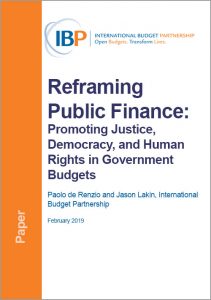Highlights:
- Access denied
- Positive standard deviation
- Sandpaper effect
- Gossip hits its price point
- Milk cans and laundromats
- Full disclosure – Singapore style
- Find your collaborationistas
- TAI spotlight: From a new round of 100 & change to building a fairer data society in Latin America
In case you missed it…
Access denied
 Photo: Pixabay
Photo: Pixabay
How are countries performing on institutional aspects of sustainable development goal 16: access to information, transparency, participation and accountability? The UN has released a report noting that while laws on access to information exist in many countries, not all have been implemented effectively – requests for information are often denied. A clear case in point is reporting by TI-Germany about the secrecy surrounding the German Public Prosecutor’s office not releasing official text of a fine levied against Airbus for bribery. “The Court argued that Article 4 of the press laws of Bavaria give the press a right to information, but not to access the file” which seems counter-intuitive.
The Centre for Law and Democracy (CLD) has been working over a period of about a year and a half in close collaboration with the Information Commissions of Khyber Pakhtunkhwa and Punjab provinces in Pakistan as well as other local stakeholders, to develop a tool for assessing the quality of implementation of right to information (RTI) laws. Check out their new methodology. How does it compare to existing tools? See the Carter Center’s Implementation Assessment Tool as one point of assessment used from Nigeria to Mexico
Positive standard deviation
In the last Weekly, we noted a lot of items on the Extractive Industries Transparency Initiative (EITI) Board’s plate. Important decisions were made that will strengthen the EITI Standard on a range of fronts from contract transparency to project-level reporting, environment, and gender reporting. In a long fought for win, the EITI standard “will now require publication of contracts and licenses that are granted, entered into or amended from 1 January 2021”. Employment data disclosures will now need to be disaggregated by gender. We might need more time to figure out what it means to have “disclosure of material payments to governments that are related to the environment and are mandated by law, regulation or contract”. The new EITI Standard should be ratified in June along with the installation of a new EITI board.
Will EITI continue to keep up with the fast pace of changing technology? See how AI and big data is already helping pinpoint new mineral resources. What potential to use big data not just to find the resources but to track the resulting production, revenues and spending?
Sandpaper effect
Like sandpaper wears down wood, repressive government actions wear down civil society. Amid rising authoritarianism, notions like legitimacy and accountability are being manipulated to silence government critics. Saskia Brechenmacher details patterns in repression of civil society work. It seems the trends noted in last year’s TAI report are only becoming more pronounced (Check out Distract, Divide, Detach: Using Transparency and Accountability to Justify Regulation of CSOs.)
The European Civic Forum is trying to lend perspective to such trends in Europe, asking some burning questions: What are the new and old challenges of civil society in Europe? How is civil society changing? How is it pushing back against democratic backsliding? Their newsletter will try to provide answers.
One positive that might merit emulation – the Australian parliament solidly passed new legislation that will give corporate whistleblowers greater protection.
Gossip hits its price point
One increasingly popular tactic of repressive governments has been to shut down internet access or use of particular social media platforms. Perhaps a more insidious way to get to that effect is through taxes. In the three months since the imposition of a tax on “idle talk” on social media platforms in Uganda, the number of internet subscriptions to such services fell by more than 2.5 million.
Certainly, the tax has not been the money maker that some in the Ugandan government had hoped for. Yet, you can expect more attempts at digital taxation, not least as motivations go beyond just replenishing government coffers. Free Press asks if imposing a tax on targeted digital advertising by Facebook and Google could promote journalism of value and restore democracy.
Meanwhile, India is barring retailers in the country from allowing foreign business entitiesaccess to data. Is this a sign of data wars to come?
Digital taxes may be the new wave of tax competition, but Mike Durst helps take us back to explain the roots of today’s broader global corporate tax system – roots that have produced tax laws that all countries, but especially developing countries with resource-constrained tax administrations, have difficulty administering effectively. Durst has recommendations for lower-income countries the challenge of effectively taxing multinational companies. Seems like Wilson Prichard might have been reading Durst, as he makes a case for strengthening the progressivity of tax systems in developing countries towards equity and transparency. (Part of our ongoing Fiscal Futures series with International Budget Partnership and Carnegie Endowment).
Milk cans and laundromats
Meanwhile, for those tax officials struggling with the reality of complex systems and limited resources, the OECD has released free (for government tax officials) tutorial courses on a number of tax principles like transfer pricing, beneficial ownership, and base erosion profit shifting (BEPS). Hopefully, those courses might soon need updating as rules evolve. They might also get some inspiration from the French court decision to order the Swiss bank UBS to pay €3.7bn for tax evasion. Judges agreed with prosecutors that UBS staff used coded notes to track how many “milk cans”—units of money—were moved to Swiss accounts French clients in a parallel accounting system.
On the dark money front, you may recall a previously Weekly covering the EU release of its money laundering blacklist comprising 23 countries. Now the Financial Action Task Force has criticized the move saying it undermines their work. Pair with a report by a committee of the EU parliament that builds a case for a police force to investigate tax evasion and financial crime and creating a watchdog to counter money-laundering.
Testament to the need comes from the latest Organized Crime and Corruption Reporting Project investigation – dubbed the Troika Laundromat – revealing a $9 billion global money-laundering scheme allegedly set up and run by Russia’s largest private investment bank. Latvia already understands that the fight against money laundering is an important contribution towards its national security that can overrule demands to attract investment. In that spirit, The Sentry’s new brief demonstrates how kleptocrats in East and Central Africa are using western currencies to move and store the proceeds of corruption.
Long read of the week

The authors argue that we need a more solid normative foundation on which public financial decisions can be assessed reflective of interrelationships between justice, democracy, human rights and equity, sustainability, effectiveness, and inclusion.
Full disclosure – Singapore style
The award season may be over, but index season continues apace. Up this week the 2018/19 Open Data Inventory (ODIN)– a global index that assesses 178 countries on the openness of official statistics. Singapore came first with an overall score of 85 followed by Denmark at 84%. From Latin America, only Mexico, Peru and Ecuador crack the top 50 slots. From Africa, it is only Rwanda with a score of 57% and Morocco with a score of 56%.
What can be done to improve African data openness and coverage? Focusing on data needs for universal health care, Michelle Mbuthia and Caroline Kabaria argue that governments need to invest in relevant, timely and accurate data production for decision-making.
Looking at data for development more broadly OECD is set to release a new “. Stat Suite” learning and data tool in June to help data modeling on the sustainable development goals and indicators. Looking to grow your data visualization skills? Then you might consider joining the data visualization society.
Find Your Collaborationistas
Who in your organization is motivated to help people get better at collaboration? They are unlikely to have a job description or title that matches, but they play an important role. How can you support them? Track this upcoming series of blogs from Eugene Kim on efforts to find and nurture a network among such collaboration practitioners.
Finally, some resources that might be helpful. To promote inclusion and openness, Better Evaluation has translated its repository of English MEL resources to Spanish. Meanwhile, Emma Smith has collated top software and resources recommended by M&E practitionersworking in data collection and reporting in global development. For more on monitoring and evaluation in the accountability space specifically – see Vanessa Malila’s blog (TAI Spotlight).
TAI spotlight
A New round of 100&Change | MacArthur Foundation
MacArthur Foundation announces a second round of its innovative $100 million grant competition 100&Change.
Building a fairer data society in Latin America | Luminate
Gabriela Hadid explains why Luminate joined Avina Foundation, Open Society Foundation, Ford Foundation, and International Development Research Centre to support Initiative for Digital Rights in Latin America (Indela).
Competencies essential for M&E practitioners in the accountability field | TAI
Dr. Vanessa Malila shares three key competencies that M&E practitioners in the accountability sector require to be effective in the work they do.
Calls: Proposals, papers, speakers and course invites
- Call for conference presentation and workshop proposals for aes19 – March 7
- Engaging with Civil Society in Belarus Call for Proposals – March 7
On the calendar
- Story Movements 2019 – March 1 – 2, 2019 (Washington, DC)
- Open Data Day – March 2, 2019
- The Surprising Power of Liberating Structures – March 11 – 12, 2019 (Seattle, Washington)
- Open Gov Week – March 11 -17, 2019
- The Liberating Structures global gathering – March 13 -15, 2019 (Seattle, Washington, USA)
- TICTec Research Conference – March 19-20, 2019 (Paris, France)
- OECD Global Anti-Corruption and Integrity Forum – March 20-21 (Paris, France)
- 3ie and IEG conference on citizen engagement and accountable government – April 8, 2019 (Washington, DC)
- The CEP Conference – May 7-9, 2019 (Minneapolis, USA)
- Csv, conf, v4 – May 8-9, 2019 (Eliot Centre, Portland)
- Collective Impact Forum Convening – May 14-16, 2019 (Chicago, USA)
- 2019 Open Government Partnership Global Summit – May 29-31, 2019 (Ottawa, Canada)
- RightsCon Tunis – June 11-14, 2019 (Tunis, Tunisia)
- Global Conference on Transparency Research – June 26 – 27, 2019 (Rio de Janeiro, Brazil)
- Tax Justice Network Conference 2019 – July 2 -3, 2019 (City, University of London, UK)
- Global Symposium (COPGS) on Citizenship, Governance, and Accountability in Health – October 15-18, 2019 (New Delhi, India)

